It was an act of great love and respect to pour perfumed oil on the head of a distinguished guest in Jesus’ day on earth. The woman in the gospel manifested her worship and love for the Savior by pouring “precious ointment” on his head. In the East, no entertainment could be perfect without this performance and it served as bodily refreshment. We understand it, in our day, as the spiritual oil or the anointing of the Holy Spirit.
By Fredi Trammell
To View the Entire Article, Click Here
To Download the Entire Article Directly to Your Computer, Click Here
To View the Outline, Click Here
To View the PowerPoint, Click Here
In the East people frequently anoint their visitors with some very fragrant perfume and give them a cup or glass of some choice wine which they are careful to fill until it runs over. The first was designed to show their love and respect; the latter to imply that while they remained there, they should have an abundance of everything.
Anointing the head with oil is a great refreshment. Three qualities of oil—laevor, nitor, and odor, produce a smoothness to the touch, brightness to the sight and a delightful fragrance to the smell which gratifies senses and causes delight to those anointed with it. Solomon refers to this when speaking of a cheerful life: “Let thy head lack no ointment” (Ecclesiastes 9:8). This “oil of gladness” represents the Holy Spirit’s unction which alone rejoices and exhilarates the soul of man.
“Thou hast loved righteousness and hated iniquity; therefore God, even thy God, hath anointed thee with the oil of gladness…” (Hebrews 1:9) and the “joy of the Holy Ghost”:
“And the disciples were FILLED WITH JOY AND WITH THE HOLY GHOST” (Acts 13:52).
“For the kingdom of God is not meat and drink; but righteousness, and peace, and joy IN the Holy Ghost” (Romans 14:18).
“Now the God of hope FILL YOU WITH all joy and peace in believing that ye may abound in hope, THROUGH THE POWER OF THE HOLY GHOST” (Romans 15:13).
The anointing oil, used in the sacred sense as applied by the scriptures, is a coveted resource of all Christians, and rightly so. The title, Christ, given to Jesus signifies “the Anointed one.”
In order for kings, priests, and other persons or any object to be set aside for use in the Kingdom of God, anointing oil was used according to scriptures in the Old Testament to sanctify, dedicate, and commit this vessel (human or inanimate) to be used for God’s purposes alone. The anointing oil is the symbol of the Holy Spirit’s seal of approval, sanctification, dedication, and \or commitment of a child of God.
“Now he which stablisheth us with you in Christ, and hath ANOINTED us, is God; Who hath also SEALED us, and given the earnest of the SPIRIT in our hearts” (2 Corinthians 1:21, 22)
The scriptures declare that all New Testament Christians are kings and priests:
“And from Jesus Christ, who is the faithful witness, and the first begotten of the dead, and the prince of the kings of the earth, Unto him that loved us, and washed us from our sins in his own blood, and hath made us kings and priests unto God and his Father; to him be glory and dominion for ever and ever. Amen” (Revelation 1:5,6).
To View the Entire Article, Click Here
To Download the Entire Article Directly to Your Computer, Click Here
To View the Outline, Click Here




